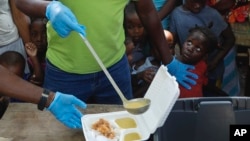The head of the U.N. children's agency, UNICEF, said Monday that 3 million Haitian children impacted by rampant gang violence need humanitarian assistance, including thousands who are at risk of death from severe malnutrition.
"Each day, children are being injured or killed," Catherine Russell told a meeting of the U.N. Security Council. "Some are being recruited, or they are joining armed groups out of sheer desperation."
The murder rate in Haiti has soared this year, with 2,505 people killed or injured in violence between January and March — a 53% increase over the final three months of 2023. Recent UNICEF data indicate between 30% and 50% of Haiti's gangs have children in their ranks.
Nearly half the population, almost 5 million people, is acutely food insecure, as gangs block major roads from agricultural areas to the capital, food prices rise, and the country's main airport has been closed since March 3 because of gang activity around it. The country relies on imports for half of its food.
"Recent findings from the IPC analysis indicate an alarming 19% increase in the number of children projected to suffer from severe acute malnutrition in Haiti this year," Russell said, referring to the Integrated Food Security Phase Classification, a U.N.-backed food analysis index. "The analysis also showed that 1.64 million people are facing emergency levels of acute food insecurity, which increases the risk of child wasting and malnutrition."
She said the growing insecurity in the capital, Port-au-Prince, has made it nearly impossible for critical health and nutrition supplies to reach at least 58,000 children suffering from severe wasting – the most life-threatening form of malnutrition.
"The Martissant road, the only humanitarian corridor from Port-au-Prince to the southern regions, remains blocked, leaving an estimated 15,000 children suffering from malnutrition at risk of death," she said.
As services break down and clean water becomes less available, cholera has returned and the numbers are growing, with 80,000 suspected cases.
"The situation in Haiti is catastrophic, and it grows worse by the day," Russell said.
Aid workers are continuing to deliver when they can, despite insecurity and a massive funding gap.
Haiti's U.N. envoy said the situation "is going from bad to worse."
On top of hunger and violence, Ambassador Antonio Rodrigue told the Security Council that gangs are looting private companies, especially medical companies.
"This has resulted in a serious shortage of medicines and medical products, hospital beds and blood products, including in the capital," he said. "Movement restrictions due to insecurity and improvised roadblocks are serious obstacles to the delivery of urgent medical equipment and medicines."
He called for the rapid deployment of the multinational support force that the council authorized in October 2023 to support Haiti's police. Kenya has offered to lead the non-U.N. force and several countries have offered to contribute personnel, including Antigua and Barbuda, Bahamas, Bangladesh, Barbados, Benin, Chad, Jamaica and Suriname.
The force has been beset with delays, including court challenges in Kenya and a shortage of funding.
In a positive development, Haiti's political process appears to be moving forward, with the publication on April 12 and 16 of executive decrees establishing the Transitional Presidential Council and appointing its members. An interim prime minister and government still need to be appointed and the Provisional Electoral Council members nominated. However, gang leaders have threatened to violently disrupt the nascent political process.
Haiti has been in turmoil since the July 7, 2021, assassination of President Jovenel Moise at his home in the Port-au-Prince suburb of Petion-Ville. Armed gangs now control much of the capital and have spread to other parts of the country, where they have carried out massacres, kidnappings, human trafficking and sexual violence.




